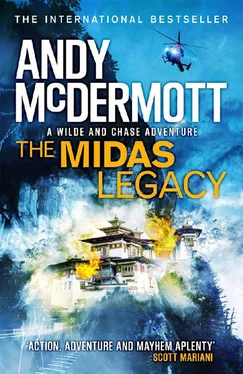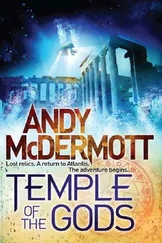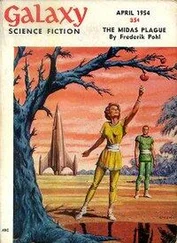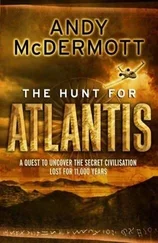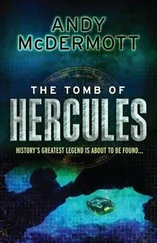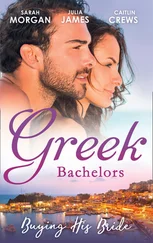Andy McDermott
The Midas Legacy

Andy McDermott is the bestselling author of the Nina Wilde & Eddie Chase adventure thrillers, which have been sold in over 30 countries and 20 languages. His debut novel, THE HUNT FOR ATLANTIS , was his first of several New York Times bestsellers. THE MIDAS LEGACY is the twelfth book in the series, and he has also written the explosive spy thriller THE PERSONA PROTOCOL .
A former journalist and movie critic, Andy is now a full-time novelist. Born in Halifax, he lives in Bournemouth with his partner and son.
For Sebastian
My adventurer
New York City, 1974
Henry Wilde took a deep breath as his name was called, summoning every scrap of self-assurance before standing. The twenty-plus people in the lecture hall regarded him expectantly as he headed for the lectern. A jury of his peers, he mused; the other undergraduates in his class. Some were friends — his roommate Jack Philby gave him a reassuring grin — but most were acquaintances at best, or even just faces in the crowd. The tall young New Yorker’s obsession had put work ahead of socialising.
Obsession . That was perhaps hyperbolic, but he couldn’t deny that his childhood fascination had intensified so much that it had determined his choice of degree. Now he was about to reveal that obsession to the jury.
And to the judge. Professor Orin Brighthouse stared at him over the thick black frames of his spectacles, the expression on his rumpled face one of bored disdain. Another student with a chew toy for me to maul , he didn’t need to say out loud. Brighthouse was highly regarded in the field of archaeology, but he was also scathingly critical of ideas that challenged the status quo. It took a lot to impress him. So far, none of the other students had done that.
There was always a first time, Henry told himself as he reached the front and took out his essay. He had rewritten it twice over the past two nights, trying to put forward his theory as clearly and convincingly as possible. Brighthouse’s class made up only one part of his course, but it was an important one. A good result here would help him enormously in the future. A word from the professor could open many useful doors…
But first, he had to win that word.
‘Peer review is an important part of the academic process,’ intoned Brighthouse as if reciting the words from a cue card, before tipping his head back to look down his nose at the young man. ‘But you already know that, because I’ve said the same damn thing to everyone else. So from here on, I’ll skip the usual boilerplate. I’m sure you’ve all got anti-war demonstrations or love-ins or whatever kids do nowadays to get to.’ A murmur of laughter from the audience. ‘So, Mr Wilde: what are you going to tell us?’
This was it. ‘I’m going to tell you,’ Henry began, hoping he sounded more confident than he felt, ‘the location of Atlantis.’
That certainly got the attention of the other undergraduates, whose own presentations to this point had been small in scale, subjects like the precise dating of various sites and relics discovered by others. Those who knew him weren’t surprised by the announcement, Jack giving him a humorous shrug: on your own head be it . The reactions of the others were generally more negative. Incredulity, amusement, even head-shaking mockery. Yet a few seemed curious, so it wasn’t an entirely hostile reception.
In fact, someone seemed outright intrigued. He had seen the pretty young woman sitting slightly isolated on the fourth row before — her ponytailed hair was such a vivid shade of red, it would have been almost impossible not to notice her — but their paths had never crossed socially; she had the same work-focused air as Henry himself. But she was now watching him intently, pencil poised as if eager to transcribe every word.
‘So the word on the grapevine about your topic was true,’ scoffed Brighthouse. ‘Should I give you an F now and save everybody’s time, or are you going to carry on and hope you can scrape a C for sheer imagination?’
‘I’m still aiming for an A, Professor,’ Henry replied, hoping his sudden feeling of nausea wasn’t showing on his face. ‘I think you’ll be impressed. I’ve—’
‘I wouldn’t bet on it,’ the academic rumbled.
‘I’ve done my research,’ Henry went on. ‘Atlantis might be best known from Plato’s texts, but there are plenty of corroborating sources describing a great seagoing empire that either pre-date them, or developed independently from the Greek dialogues. When you put them all together, you get a very interesting result.’
The red-haired woman had already started taking notes, her green eyes briefly meeting Henry’s. The moment of contact gave him an odd feeling of reassurance, as if she were already convinced by his words. But it evaporated the moment he looked back at Brighthouse.
‘Just because you find something interesting, Mr Wilde, does not guarantee that it is of worth,’ said the professor, glowering. ‘Some people find horoscopes, comic books or UFOs interesting. That doesn’t mean the study of them has any value whatsoever.’
A twinge of anger fuelled Henry’s reply. ‘Well, maybe I’ll change your mind.’
Brighthouse seemed to take that as a challenge. ‘Then go ahead.’ He leaned back in his chair, double chin pressed against his chest. ‘Impress me.’
‘I’ll do my best.’ Henry turned away from him to address the class. ‘The legend of Atlantis has long been one of the world’s most popular and enduring. A great civilisation swallowed up by the sea, taking all its wonders and treasures with it. People have spent their lives searching for it, but so far nothing has been found. The hunt for Atlantis is a great story, but that’s all it is. Or… is it?’
His classmates were thankfully doing him the courtesy of appearing attentive. Jack, who already knew the basics of his theory, was waiting to hear the specifics — no doubt so he could pick holes in them and tell Henry he was wasting his time chasing a myth, as usual. But the redhead also seemed eager to hear more.
Well, two people were interested, at least. He pressed on. ‘The Greek philosopher Plato gave us the first known references to Atlantis in Western culture, in his dialogues Timaeus and Critias . The general belief in academia is that Plato’s Atlantis was fiction, a hypothetical; a way for him to expound his theories on a perfect society. But I believe there’s more to it than that — I believe that his descriptions of Atlantis and its empire are based in fact. And here is why…’
* * *
The presentations of the other students over the past couple of days had generally weighed in at around fifteen minutes, followed by discussion: the peer review. Even as he spoke ever more quickly in his excitement, Henry’s went on for almost twenty-five. Mouth dry, he finally reached his conclusion. ‘So in summary, if a search for Atlantis is to be made, the kingdom itself is most likely to be found exactly where Plato stated it would be: beyond the mouth of the Mediterranean, in the Atlantic. But there must surely be other outposts still to be discovered. I’ve already mentioned potential sites in Morocco, Libya and Egypt, linked to the so-called Sea People. And there are possibilities even further afield, through central Asia all the way to the Himalayas. There is a whole world of opportunities to prove that Atlantis is more than just a myth, for those with the dedication and determination to find them. Thank you.’
Читать дальше
